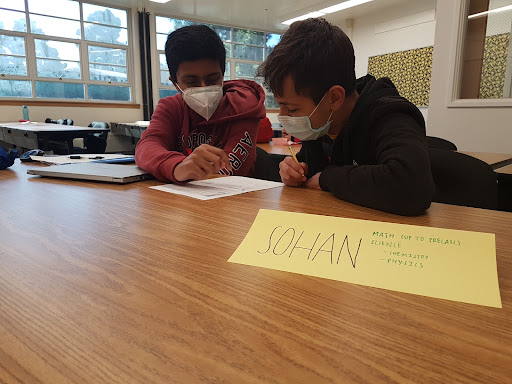Final Tips for Studying for Finals

Art/Photo by Anika Agarwal
As a tutor for Tutorial Club, Sohan Devalapurkar (11) helps students in the library at lunch and after school free of charge. In addition to offering help on a regular basis, Tutorial Club tutors plan to help teachers during potential cram sessions before finals.
January 13, 2022
Textbooks, highlighters, and a mug of coffee: this is what finals week looks like each year, with students from all grade levels working hard to seal the grade they want. Often, there isn’t enough time or students’ minds are in turmoil regarding what to prioritize ― leading to confusion and mismanagement of schedules.
Studying for finals isn’t a magic trick that can happen a week prior to the actual exams ― it requires constant effort and the will to learn throughout the semester. As Sohan Devalapurkar (11) shared, “I don’t feel too bad for finals,” since he worked hard meticulously the entire semester by asking his teachers questions whenever they surfaced. He believes that “studying for it [finals] a few weeks prior isn’t the best method . . . it doesn’t really help you in the long term.” The content covered in semester one is likely going to be tested in semester two as well. Essentially, memorizing the material solely for semester one, only to end up forgetting by the time semester two hits, isn’t the characteristic of a diligent student.
So, the first tip for studying for finals is to retain information as long as possible so that on the day of the test, you can recall the material. In some cases, familiarity with topics from semester one can guide you in your preparation for AP exams, which take place in May. Devalapurkar explained the key to remembering much of the content from his five Advanced Placement (AP) classes: “I think by asking questions I end up understanding the concepts and then, I just end up remembering them because I understood them.”
Another important tip to acing your final exams is to know what you are going to be tested on! If you don’t know what is going to be on the test, how will you study for it? Sriharshini Gubbala (12) suggested talking with your teachers “to make sure that you know everything that’s going to be on the test and you’re familiar with the material. Ask them . . . these are the units that are being covered, right, or did I miss anything? Or, is there any additional stuff that I need to know apart from the ones I have on my [review] sheet?” As soon as you have confirmed what you absolutely need to know, make a schedule and start your preparations!
Devalapurkar specified that making a schedule of the tasks that need to be done helps him avoid procrastinating. He joked that “if you just YOLO it, it’s not good and not the most efficient method since you might spend more time” on planning than actually accomplishing the assignment. After coming up with a schedule, onto studying!
Many high schoolers are confused about how to cover all the material that they learned in the 80 days of schooling prior to finals. Gubbala shared a tactical approach which is to “make a summary and . . . use that before the finals as a preparation guide.” If you don’t already have summary notes, try to find review sheets online. Gubbala strongly feels similar to the way Devalapurkar does: true studying doesn’t happen a week before finals ― it occurs over the entire semester.
However, it’s not always that simple; some students aren’t able to study during the semester. For example, seniors are expected to complete their college applications, which are due at the end of November for California public schools and January for private universities. Gubbala recalled her own time-consuming college application process and how troublesome it was to juggle five APs while dealing with senioritis. Because of the combined intensity of all three factors, she thinks that senior year finals are the hardest.
Studying can get monotonous, but mixing up subjects in your schedule can “break the monotony of studying for that one subject and make it easier to remember,” as Devalapurkar added. When you study one subject for an hour and then another for an hour, your brain is constantly shifting gears, which helps keep it active throughout the study session.
Another tip specific to math and math-based science classes, according to Devalapurkar, is doing practice problems: “It’s easier to understand something if you’re doing practice questions rather than just studying how to do it.” Try to solve the example problems that your teacher went through in the class by yourself. This exercise will show you how much more work you need to put in to reach your goals.
Finally, an encouraging thought is that knowing how you performed on semester one finals can refine your study habits over the next months, allowing you to either work harder the next time or continue to persist. Finals are an opportunity to gauge where you stand in your overall high school career.
If you have worked hard the entire semester and paid attention in class, you don’t have to stress about finals, no matter how daunting they seem. Be confident in yourself and your abilities, and remember that at the end of the day, finals are simply a way of measuring progress. If you know that you weren’t able to perform your best, learn from these experiences to not repeat the same mistakes in semester two. Be courageous, Warriors, and study smart!






